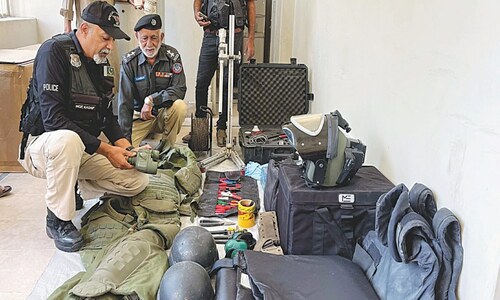KARACHI: “Don’t think of yourself as separate from the community. Community policing is community-oriented police,” said former Sindh police chief Niaz Ahmed Siddiki on Tuesday.
He was speaking at a workshop on ‘Community policing for responsive governance’ organised by Shehri-Citizens for a Better Environment (CBE) at a local hotel here.
Speaking about community policing, responsive governance and ethical police conduct, he said to the traffic police personnel that they could not just stand by doing nothing while watching an offence because that would make them an accomplice.
“You are not just regulating traffic; you are doing a national service. You are supporting people, saving important lives. Yes, it can be a thankless job. But if you are unhappy, leave. Not everyone can do what you do. Not everyone has your quality, your kind of training, your expertise. So don’t take this as any regular job and don’t take yourself for granted,” he said to them.
A former police chief points out that the Pakistan Penal Code punishes instead of issuing warnings
“In the line of duty, do soldiers think of salaries? You are also like them. Do not shrug responsibility. Stay positive. Develop passion for your work in your heart,” he added.
Fouzia Tariq, chief operating officer at the Management Consultancy and Training Services, stressed on attitudes and behaviours of police personnel and how they handle difficult and aggressive behaviours from others on the road. “You should keep your own attitude in check. Be patient. You are a police officer. You have authority,” she reminded.
Speaking about the international standards on the use of force and firearms, former inspector general of police, Sindh Asad Jahangir said that it was not the police’s job to punish people. “Your job is to hand an offender of law to the authorities. You can’t take law in your own hands because if you did that, it would become the law of the jungle. Use as much force as required,” he said.
He said there were certain documents that were mandatory for all drivers, but they still didn’t have them. He wondered why people brought out their vehicles on the road if they didn’t even have third-party insurance.
Quoting the Qisas & Diyat Ordinance, he wondered if anyone was even getting it. “People mostly push to settle accidents outside the court. But then what is the use of implementing the law? What service are we providing to the injured?”
Comparing how offenders are treated in the West and how they are treated here in Pakistan, he said that in the West first offenders are allowed to be on their way after a warning. “Then after [that] they are taken to court following a second offence, they are warned there as well and allowed to go. But here you get a little confession from a person and you lock him or her up for three years,” he said. “The Pakistan Penal Code punishes instead of issuing warnings. But is it really good to punish every little mistake and treat it as a crime?”
“Sadly, we like the word ‘crime’ while in the West they don’t even use that word as often as we do. They choose to use the word ‘offence’ instead. They also don’t call people criminals, they call them offenders. But here we don’t trust anyone,” he pointed out.
“There are better ways of handling situations and people. Treated harshly a person will also curse the system,” he added.
Pervez Ghias, former CEO of a car manufacturing company, said that he liked to think of Karachi’s roads as arteries. “So if they remain clear and open, the blood passes through them without any hindrance, keeping the circulation flow smooth,” he pointed out.
“Karachi is paying a huge cost in terms of economic, social and health losses resulting from road injuries, deaths and traffic congestion. And urbanisation and population growth is exasperating the problem. The state of road traffic is a great indicator of how society interacts,” he concluded.
Published in Dawn, October 23rd, 2019















































Dear visitor, the comments section is undergoing an overhaul and will return soon.